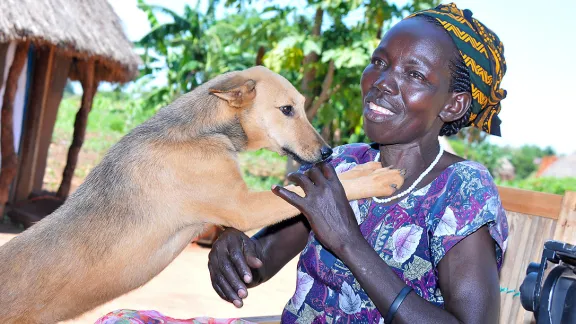
Molly Aringo with her dog. LWF has helped her embrace life again following a diagnosis of HIV. Photo: LWF/P. Kikomeko
Fighting the stigma of HIV and AIDS in Uganda
(LWI) – “The world became silent and it felt like I was the only one in it.” Molly Aringo, 48, uses these words to describe the day she was diagnosed with HIV. For her it meant the end of life as she knew it. She expected to get ill and die, alone and ostracized by a society which still sees HIV as a punishment. Instead, Aringo has become one of the strong people who share their stories with the world in order to reduce the stigma of HIV.
In northern Uganda where she lives, HIV is associated with behavior that is generally disapproved of: homosexuality, drug abuse, sex work or infidelity. This attitude is found in schools and workplaces, among most families and even in health centers where people expect to get help. Consequently, most HIV positive people keep their infection a secret.
Just the flu
Mother of five, Aringo was living with her husband in Kitgum, northern Uganda. Her husband was frequently sick, and died eventually without anyone knowing the cause. In 2003, his widow also became ill. “It was like the flu – a cough and a little temperature,” Aringo says. She first treated her symptoms with traditional herbs, until in 2004 she fell ill for a long period of time. The herbs no longer helped. “I lost weight. The color of my skin changed. I was too weak to do anything,” she says. “That’s when I decided to go for a blood test and get treatment. I thought it was malaria or typhoid.”
I wanted to preach to the public that people with HIV are still human beings, they need to be loved and treated well and isolating them is wrong. I wanted them to learn how to live with a person diagnosed with HIV.
The doctor did not only test for malaria and typhoid, but also HIV. Aringo spent a sleepless night worrying about the result. “I was heartbroken when the results came out HIV positive.”
Aringo started wondering about the cause of the infection, as she had always been faithful to her husband. “I thought of the days when he came home after midnight, claiming that work had kept him, the nights he did not sleep at home because he was out with friends discussing life on a pot of malwa (sorghum beer). I remembered when he fell sick. All the sleepless nights when I took care of him flashed before my eyes,” she says.
“I had been blind in my trust. When I got the diagnosis I compared the signs and symptoms of my late husband with mine. They were exactly the same. I wanted to rip off my skin. I felt dirty and poisonous. The worst was that I had been betrayed by the love of my life.”
Life after the news
Initially, Aringo refused to accept the diagnosis. She refused treatment. But when she started getting worse and the painkillers no longer worked, she went back to the hospital. At first she received antibiotics to treat the pneumonia she had developed, and later anti-retroviral drugs. While she got used to taking medicine regularly and her health improved, however, her social life degraded.
“Once my community got to know about my diagnosis, people completely ignored me,” she recalls. “When I went to the market or any other public place, people would whisper and point their fingers at me. No one came and asked me how I was doing. It was hurtful to the core,” she says.
Things only started to improve after Aringo started participating in an LWF counselling program. “Listening to many other people in the same situation made me realize I was not alone,” she says. From then Aringo grew stronger. The rumours in the community stopped bothering her.
Spread the word
Instead, the discussions and the education that her counselling group received made her understand why so many people are ignorant about the virus – and Aringo took action.
By forming a drama group she set out to bring awareness, education and information about the prevention of HIV. She wanted to help other women so they didn’t have to go through the pain of alienation and self-imposed shame that she endured.
“I wanted to preach to the public that people with HIV are still human beings. They need to be loved and treated well and isolating them is wrong. I wanted them to learn how to live with a person diagnosed with HIV,” she says.
The group has been to many events in Kitgum district and is recognized by the elders in society. It has gone to schools and been to social events educating married people and youth. “The drama group has helped so many people around here to interact normally with HIV positive people,” she says.
Aringo has paid off her children’s tuition. Her eldest child has finished university. She is now building a bungalow so she can move from the hut. “Being fearless gave me hope,” she says. “I want to thank LWF for changing my life. I would be dead if it were not for them.”
Contribution by Niona Agasha and Pius Kikomeko


